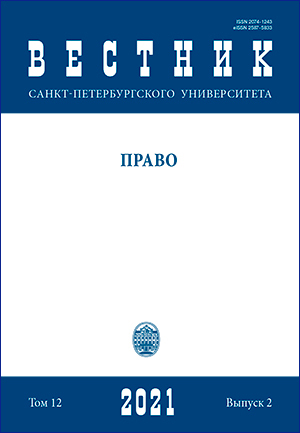Main directions of legal regulation of the use of artificial intelligence in the context of a pandemic
DOI:
https://doi.org/10.21638/spbu14.2021.201Abstract
Artificial intelligence technologies are considered today as an integral part of the life of our society. Problems and research on the use of artificial intelligence is carried out at the intersection of many scientific fields. Jurisprudence is no exception. In recent years, there has been a tendency to harmonize law in accordance with new challenges and global trends in the development of the information society, which includes the introduction of information and communication technologies into social processes. This causes a change in the system of public relations and the formation of specific branches and sub-branches of law, in particular information or digital law. The Russian Federation, like most modern states, has put forward serious tasks to create a system of legal regulation of artificial intelligence. This issue has become especially urgent in the context of the spread of the COVID-19 pandemic, which triggered the expansion of the introduction of artificial intelligence technologies. The authors in the study raise the question of the most important areas of regulation in the use of artificial intelligence, primarily for sustainable economic development in a pandemic as well as for the activation of innovative technological entrepreneurship. The authors analyzed strategic documents and the legal basis for regulating artificial intelligence, science and technology of the digital economy in Russia. Based on the study of foreign practices in regard to normative legal regulation of the digital economy and artificial intelligence, the features of approaches in Europe and East Asia are revealed. The problem of digital ethics and ethics of artificial intelligence in the context of the COVID-19 pandemic is acknowledged, and the prospects for the development of Russian legislation in the field of artificial intelligence are presented.
Keywords:
legal regulation, artificial intelligence, pandemic, ethics, experimental legal regimes, personal data, information legislation, business legislation
Downloads
References
Downloads
Published
How to Cite
Issue
Section
License
Articles of "Vestnik of Saint Petersburg University. Law" are open access distributed under the terms of the License Agreement with Saint Petersburg State University, which permits to the authors unrestricted distribution and self-archiving free of charge.






